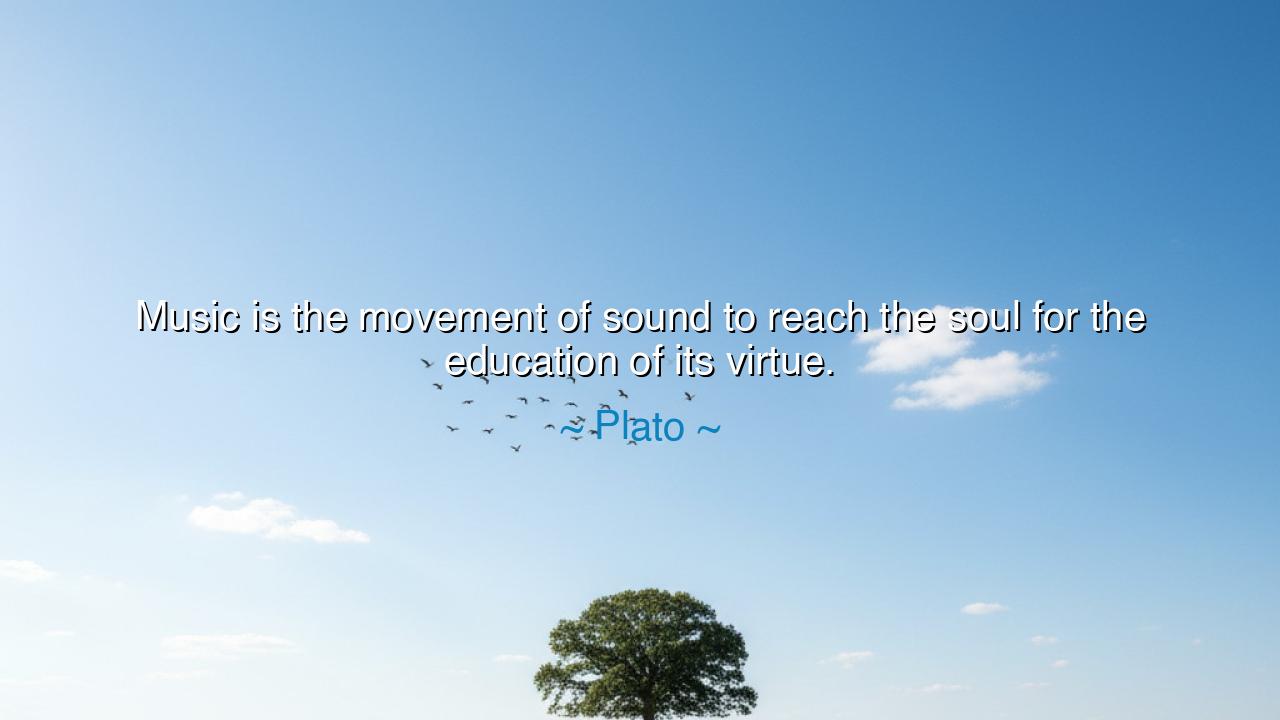
Music is the movement of sound to reach the soul for the






“Music is the movement of sound to reach the soul for the education of its virtue.” Thus spoke Plato, the philosopher of Athens, whose mind sought not only to measure the stars but to fathom the depths of the human soul. These words are not the light musings of an idle poet, but the solemn decree of one who believed that harmony itself was woven into the fabric of the universe. For Plato taught that the soul is shaped by rhythm and melody, and that through music, the very character of a man could be lifted toward virtue—or cast into disorder if the music were corrupt.
To Plato, music was not mere entertainment. It was the unseen teacher, the invisible architect of the heart. The movement of sound, like waves upon the shore, strikes not the body but the spirit. It bypasses the defenses of reason, and speaks directly to that hidden place where passions are born. And when guided by wisdom, music becomes a vessel carrying the soul toward balance, justice, and goodness. But when perverted, it can stir chaos, greed, and violence. Thus, Plato saw music as a sacred force, one that must be cherished, guided, and honored, for it holds sway over the destiny of both individuals and nations.
Consider the story of Sparta and Athens. Sparta, stern and disciplined, forbade soft and decadent music, for they feared it would weaken the spirit of their warriors. Athens, city of art and thought, cultivated music not only for beauty but for education, believing that the harmonies of the lyre and flute could shape citizens into beings of balance and grace. Both cities, though so different, bore witness to Plato’s teaching: that music molds the soul, and the soul molds the city. A society’s music is never idle; it is a mirror of its values, and a forge of its future.
Even in later ages, we see this truth alive. When enslaved peoples in America lifted their voices in spirituals, their songs were not only laments but lessons in endurance, courage, and hope. The music moved beyond sorrow to strengthen the soul with dignity and purpose. From those spirituals would later rise the cries of freedom in the Civil Rights Movement, proving Plato right: music can reach the soul, and in reaching it, educate its virtue. In song, oppressed people found resilience, justice found its voice, and entire generations were taught to hope.
What lesson must we draw from this ancient wisdom? It is that we must be mindful of the music we let dwell in our hearts and homes. For every song we hear shapes us, whether we perceive it or not. If our music exalts love, courage, and peace, our souls will incline toward the same. But if our music glorifies greed, anger, or emptiness, the seeds of these vices will also grow. To choose our music is to choose the nourishment of our souls. As Plato warned, the melodies of a culture can either raise a people to virtue or hasten their decline.
Therefore, let us hold music not lightly, but reverently. Let parents teach their children songs of dignity and beauty. Let leaders remember that a nation’s music reflects its soul more truly than its monuments. And let each of us seek melodies that stir not only our passions but our higher selves, melodies that awaken in us justice, compassion, and joy. For as Plato reminds us, the purpose of music is not only delight but education—not of the mind alone, but of the soul’s virtue.
So remember these words as a charge: “Music is the movement of sound to reach the soul for the education of its virtue.” When next you hear the notes of a song, ask yourself: what is this teaching me? What seed is it planting in my spirit? Choose then with wisdom, and let your music be a ladder for the soul, leading ever upward toward harmony, truth, and the good. In this way, you will not only listen—you will be transformed.






AAdministratorAdministrator
Welcome, honored guests. Please leave a comment, we will respond soon